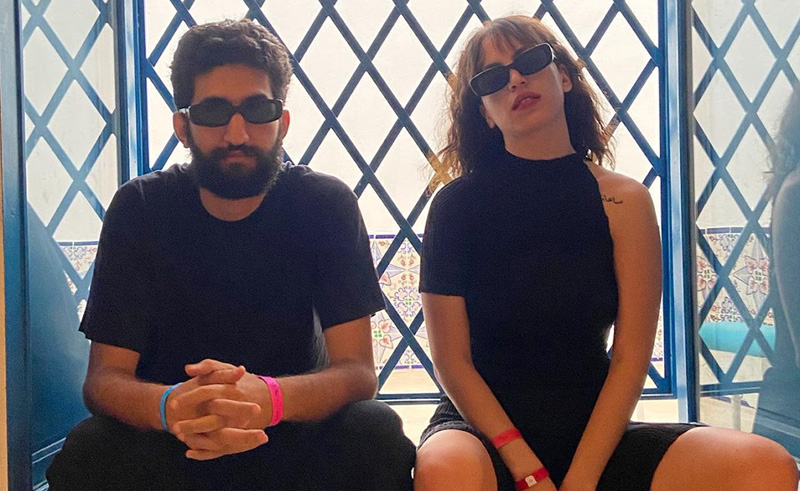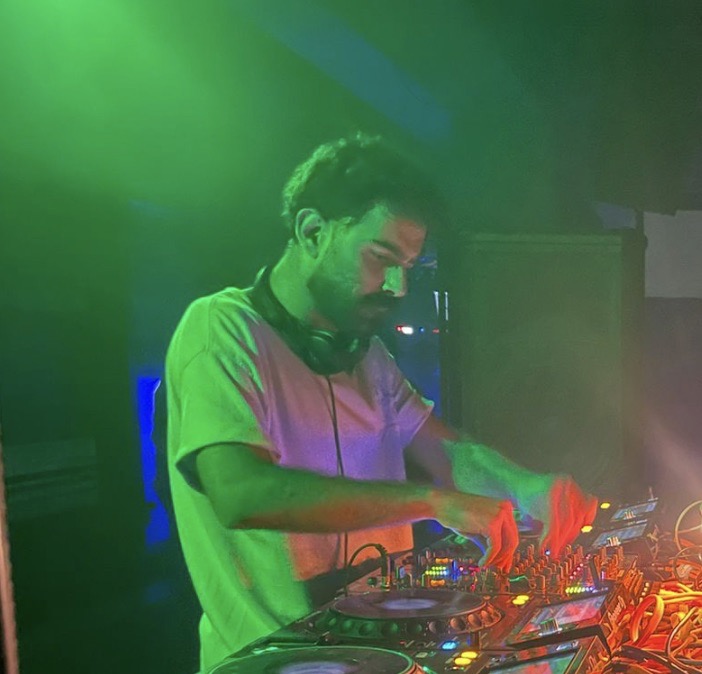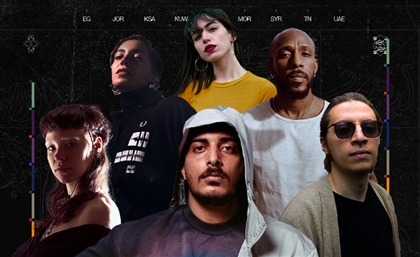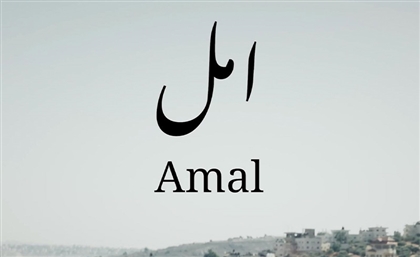The Making of KOAST: Unfiltered, Unhindered, and Heading South
SceneNoise contributor Majd Shidiac sits down with Tunisian rapper KOAST to discuss her ever-transformative growth.

In 2019, Paris-based Tunisian singer Amal released her debut EP B-Town Vol.1 under the name KOAST for the first time. She would then go on to break through various realms of musicality, often found in the porous spaces between scales, flows, and Maqam. Writing and composing her own music, the world of KOAST swings between the spoken, sung and felt.
“I’d have the same satisfaction listening to RnB by Monica or Aaliyah, as I’d have listening to Umm Kulthoum. It doesn't go separate ways in my head, it settles in the same place [in my ears]. In the process [of creating], everything I heard and everything I’ve listened to blends…”
Greeting the world with ‘Bayati South’, the over-a-minute-long track built on a Bayati chorus line of longing, KOAST offers a visceral moment stranded in time. Flowing through modulated filters into alluring clarity, her vocals seep into the fabric from a distance. As if paying homage to classical Tarab, the track finds home in emotive repetition. “Hide if you can’t look at me, and stop if you ain’t headed South. Cuz I don’t wanna play on you.”
While KOAST delivers the purified emotion of an Arabic Bayati scale, she sings in English. With that, she comfortably exists in three-dimensional temporality: Not entirely the past, not far from the future, and as momentary as the present. “I’m someone that’s born in 93- and I’m living in the now you know. I’m heavily impacted by RnB and Hip-Hop- I like to think that all these genres blend in my head and ears in a way to give birth to this body of art. You can hear the oriental vibe, and it’s heavily there- but it’s also so new, it’s like 2023.”
Flowing down the stream, KOAST picks up her inspirations and experiences along the way, they become part of her making, and she weaves them into new forms of expression. While breaking through an eclectic range of genres and styles, she can be found singing English lyrics in Arabic scales, or Arabic lyrics on Afro-beat. For KOAST, this amalgamation of sounds and inspirations comes as an organic pursuit of self-indulgence. “I never sat with myself and said, ‘Okay, I’m gonna blend this with that and try to make a sound that identifies as something.’ I literally just listen to and enjoy a wide range of genres and am impacted by them, and at the moment I’m creating, it all comes together to give birth to tracks like ‘Bayati South’ or ‘Belek’; it’s just satisfaction.”
Behind the scenes of B-Town was a serendipitous moment that will mold Amal’s musicality over the upcoming years. After watching some of her videos online, Tunisian director and cinematographer Rip Slr connected with Amal, studying music in Paris at the time, with a proposition that will soon give birth to KOAST. “He asked if I had any demos, and I had maybe 1 or 2 I’ve recorded at home with a friend. It was nothing special at all, I mean it was unmixed, unmastered on a type-beat from Youtube; I mean really it was nothing. And he was like okay, if you have demos send me your stuff and I know the person you need to be in touch with.”
Slr connected Amal with Souhayl Guesmi aka Ratchopper, the Tunisian producer, composer, and founder of Bloc C record label known for his extreme versatility. A connoisseur of delicate sounds, collaborating with artists that have heavily impacted the Pan-Arab music scene including the late Cheb Terro, Ratchopper was never a stranger to the occult and peculiar; a perfect force for the tidal wave of KOAST.
“...I always think about it- if Ratchopper wasn’t the producer I first started with, shit would have been different, you know.”
 For the two musical minds, the premise was simple yet exhilarating: KOAST would take a month to work on B-Town and fly back to Tunis to record the EP over two days in Ratchopper’s studio. “You know, the chemistry was so unbelievable. He understood everything I wanted to say and express, and he took that to a whole other level. Ratchopper not just helped me, but like, he completed me in a way.”
For the two musical minds, the premise was simple yet exhilarating: KOAST would take a month to work on B-Town and fly back to Tunis to record the EP over two days in Ratchopper’s studio. “You know, the chemistry was so unbelievable. He understood everything I wanted to say and express, and he took that to a whole other level. Ratchopper not just helped me, but like, he completed me in a way.”
Perhaps Ratchopper’s most noble feat wasn’t only that he was able to intricately push KOAST’s leftfield musicality, but it was that he was able to serve her truth. “...he completed my vision, you know. I compose, write my own shit, and bring the song to him already done. What he will do with it, is like he gets it and he makes it better- he takes it to a whole other level where he polishes it, pushes it with the production and he makes sure that like, I don’t know how to say this, he completes what you’re missing- you know, he never misses in getting my points across, in completing my ideas.”
Ratchopper’s flexibility continues to be valuable, considering KOAST’s multivarious nature and lifelong connection to the music, having grown up as a Jazzhead with an affinity to the classical Arabic music she was immersed in from childhood. Between performing jazz classics in bars and pursuing her studies in Music and Interpretation at The Higher Institute of Music of Sousse, KOAST never missed a chance to lose herself in the music despite her backhand clash with the restrictions of the ‘repertoire’.
With the 08/09 rap movement in Tunis imprinted in her memory, Amal has always wanted to explore the raw sides of her musicality and break out into her own thing. “I mean I know how to read music from a partition and everything, but you know, I needed to be free with it.” Surely, as soon as she was given the chance, KOAST was able to flex and challenge her artistic parameters.
Flowing seamlessly between English, Arabic and French, KOAST merges world waters in her stream. Emerging with laid-back RnB and Neo-Soul records like ‘BELLY’ and ‘Questions’; subtly breaking into oriental licks on records like ‘Low Key’ and ‘MAI’. Exploring more dancehall, upbeat avenues in full KOAST colour on tracks like ‘Japan’, ‘K.O.W’ and ‘Common Sense’. All the way to laying soft-spoken and hard-hitting bars with tracks and features like ‘Kima Nina’, ‘Sekkon Chance’, and ‘Ball Hitter’. KOAST the concept, the empire and the waters downstream.
-9ec10906-1670-402d-8dbf-8a6462be87f6.jpg) “...I mean, I move a lot, I love to live new things, and I’m never too shy to put it in the music: Today, I wanna rap and be aggressive, tomorrow I want to be so vulnerable and sacred and sing. Sometimes I wanna be both, on the same track.”
“...I mean, I move a lot, I love to live new things, and I’m never too shy to put it in the music: Today, I wanna rap and be aggressive, tomorrow I want to be so vulnerable and sacred and sing. Sometimes I wanna be both, on the same track.”
For many, this genre-surfing may feel sporadic. For the fans, it’s an indulgence into the depth of KOAST’s vocal range and musical sensibility. For KOAST, it’s her way of pursuing, exploring, fiddling with, exploiting, and understanding her life- this is where Amal and KOAST meet. “I went through so much, in Tunis, out of Tunis. Sometimes people don’t get it, like why aren’t you posting as much? Like I live- I mean to be able to write this music, you need to actually go out there and live, and get your heart broken, and get your mind fucked up, and have doubts- this is how you’re able to write.”
Knowing that gives an entirely new light to the KOAST listening experience. In part, it disarms the listener and allows us to seep vicariously into our own memories of love, heartbreak, rebellion and indulgence. In another, this is how the waters are meant to flow. “I like to express some states of mind, or what I’ve felt- I’m not telling you this is right or wrong, or telling you too much even. I just like to sit with a pen, and write what I’m feeling- if I’m angry, I’m angry, if I’m in love, I’m in love, if I’m sad, I’m sad- that’s it.”
-2d0387a6-8db5-4a7e-b409-894fe520fb38.jpg) “It’s just so free for me, you know- if music stops being a place where I feel comfortable, I won’t do music anymore. This is how it is.”
“It’s just so free for me, you know- if music stops being a place where I feel comfortable, I won’t do music anymore. This is how it is.”
While KOAST merges, moulds and transcends, her journey remains a duality of both defining herself and running away from imposed definitions. It becomes tricky, as new forms require definitions to be understood, and sometimes quite literally when talking about the industry. “If you want to get signed, the first question you’re gonna be asked is where do I put you? In what market do you fit?” Yet, KOAST remains uncompromising in her intrinsic pursuit of melding inspiration, being herself, and dancing a whirlwind of notions.
The ride has surely been eventful as KOAST performs in cities on all sides of the ocean and features on all kinds of projects. While wearing her heart and speaking her mind, KOAST has been met with kindred spirits that make her feel more at home. She especially reminisces on meeting and collaborating with all the great Hip-Hop artists working on The Rise of a Gang. “I was still a lady amongst men, but that didn’t matter, you know. They were just happy to have me, they recognized my talent and my shit and they were into it. Just be you, and bring what you have to add to this- it was so dope, it was so nurturing.”
The waters are sometimes muddied when Amal engages people with unreciprocated authenticity. Promoters who want to push their agendas, or friends who prefer the association over the artist. While this puts strains on Amal’s energy and lived experiences, it also makes for great lessons on acceptance and liberation, especially after heartfelt shows. “Some people can really appreciate you for a moment and then like to move on- that doesn’t mean it wasn’t real, you don’t have to be oversensitive about it… I mean I’m not saying people are wrong all the time, I’m wrong too- I need to be less sensitive about stuff you know, just chill, have a good moment, and then go home.”
It’s hard to put a label on an artist as versatile as KOAST. Either way, that’s the one thing she won’t entertain. As transformative as the Nile, and as emotive as the Mediterranean, KOAST is a spirit of water and wind: can be felt but cannot truly be tamed. While there’s no telling where she’s headed next, and what that will sound like, we can assure you that you can always find KOAST making her way down South. “Even though you think I’m this or that person, I’m so free to accept whatever, and still be comfortable being myself. I’m not defined by anything, I’m only defined by my ideas.”
- Previous Article سندباد الورد أضحي سلطاناً: مراجعة لألبوم شب جديد والناظر 'سلطان'
- Next Article Select 187: Mixed by Sannude
Trending This Week
-
Apr 23, 2024
























